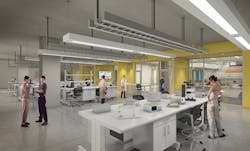There is no shortage of talk in this industry—or really any other, actually—about how to attract the youngsters entering the workforce these days, and how to give them the skills they’ll need when they do start their first gig in the automation space. At the last conference I attended, the prevailing mutter was about manufacturers getting so desperate to find good help that they were snatching students up before they’d even received their degrees. Maybe they’ve learned enough within a couple years of college education, and they’re not going to learn the skills they really need within the university walls anyway. So grab ‘em now.
On the flip side of that equation, we seem to be seeing more companies getting directly involved in shaping the curriculum at their local colleges and universities, and giving them the resources they need to shape the next generation of successful science, technology, engineering and math (STEM) graduates. It’s in this second vein that Emerson is providing advanced automation technologies to undergraduates of one of the largest engineering schools in the country, donating $1.5 million to help provide a modern, high-tech, hands-on learning environment that simulates real-world plant operations found in oil and gas, refining, life sciences, food and beverage and other industries.
Emerson and Texas A&M will establish the Emerson Advanced Automation Laboratory within the Zachry Engineering Education Complex, a 525,000-square-foot state-of-the-art facility under construction on the campus in College Station, Texas. Scheduled to open this fall, the complex will focus on a new way of learning for the university’s undergraduate students. Traditional classrooms and lecture halls will be replaced with optimized learning techniques and technologies.
Hands-on learning opportunities will also include a fully functional distillation column, for which Emerson will provide the process control equipment. Next door to the distillation column, students and faculty will be able to meet to study and problem solve in the new Emerson Collaboration Room. Emerson will also work with the College of Engineering to integrate and expand its industrial wireless technologies throughout the Zachry Engineering Education Complex.
“We are grateful to Emerson for its support of this facility and providing our students with next-generation automation and wireless industrial technology to prepare Aggie engineers for the future,” said M. Katherine Banks, vice chancellor and dean of engineering.
The Emerson Advanced Automation Laboratory is expected to serve 1,400 engineering students a year. With its 25 by 25 initiative, Texas A&M aims to grow its engineering enrollment from 19,000 students to 25,000 students by 2025. A key part of that initiative is to provide increased inclusion of underrepresented groups in STEM education. This past fall, Texas A&M boasted the largest entering class of female engineering students in the nation.
“Emerson is partnering with Texas A&M not only because it’s one of the leading engineering schools in the country and has a great research component, but also because we are impressed with its efforts to enroll and graduate higher numbers of underrepresented groups in engineering, especially women,” said Mike Train, executive president of Emerson Automation Solutions. “This investment builds on Emerson’s commitment to STEM education and training aspiring engineers and manufacturing workers to join the digital workforce that is in demand around the world.”
Emerson works with more than 350 institutions worldwide—from two-year technical community colleges to four-year university programs at the undergraduate and graduate levels—to support STEM education.
The Emerson Advanced Automation Laboratory will include the company’s DeltaV control system hardware and software, Fisher control valves, Rosemount measurement devices, Appleton field components, Micro Motion Coriolis meters and integrated simulation software. The lab will also feature maintenance training simulator equipment that will be fabricated by students studying at Ranken Technical College in St. Louis, where Emerson is headquartered.
Leaders relevant to this article:

